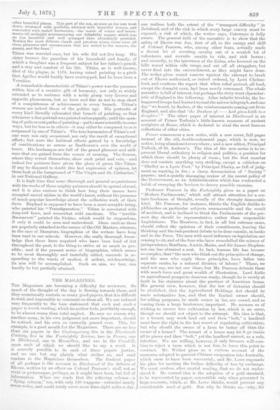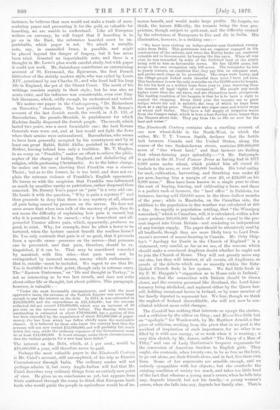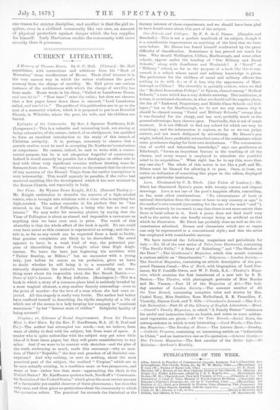THE MAGAZINES.
TIM Magazines are becoming a difficulty for reviewers. So much of the thought of the day is flowing towards them, and they occasionally contain so many good papers, that it is difficult to read, and impossible to comment ou them all. We are reduced very frequently to the bare statement that such and such a paper is worth reading, which its author feels, justifiably enough, to be almost worse than total neglect. He sees no reason why another essay, in his own judgment not more important, should be noticed, and his own so cursorily passed over. This, for example, is a good mouth for the Magazines. There are no less than six papers in the Contemporary, five in the Nineteenth Centwry, five in the Fortnightly Review, two in Fraser, one in Blackwood, one in 3facmg/aff, and one in the CorahM, upon each of which we should like to say a word. It is scarcely possible to do each of these papers justice, and we can but say plainly what strikes us, and send readers to the Magazines themselves. The freshest paper of all perhaps is the account in Blackwood of the defence of Ekowe, written by an officer on Colonel Pearson's staff, not so vivid or picturesque, perhaps, as it might have been, but full of information. When one reads that the relieving column—a flying column," too, with only 130 waggons—extended nearly seven miles, and could rarely cover more than eight miles a day,
one realises both the extent of the " transport difficulty " in Zululand, and of the risk to which every large convoy must be exposed, a risk of which, the Writer says, Cetewayo is fully aware. The general drift of the narrative is to show that the safety of Ekowe was due, first of all, to the energy and skill of Colonel Pearson, who, among other feats, actually made a decent lot of scouting cavalry out of a scratch lot of volunteers and recruits unable to ride, and sick horses ; and secondly, to the ignorance of the Zulus, who hovered on the hills round within rifle range, and cut off all stragglers, but never fired into the entrenchment, as they might have done. The writer gives sound reasons against the attempt to break out of Ekowe authorised, or indeed ordered, by Lord Chelms- ford, and confirms the report that when relief arrived, all food, except the draught oxen, had been nearly consumed. The whole narrative is full of interest, but perhaps the story most character- istic of England is the following. After infinite trouble, the be- leaguered troops had learned to read the mirror telegraph, and one day " we heard, by flashes, of the reinforcements coming out from
England, and• also that the Duchess of had given birth to a daughter.'" The other paper of interest in Blackwood is an account of Prince Torlonia's little-known museum of ancient sculpture at Rome, which is declared to rival the most famous collections of other cities.
Fraser commences a new series, with a new cover, fall pages instead of the old, double-columned page, which is now, we notice, being abandoned everywhere ; and a new editor, Principal Tullooh, of St. Andrew's. The idea of the new series is to re- present liberal orthodoxy in religion and politics, a position for which there should be plenty of room ; but the first number does not contain anything very striking, except a criticism on " Shelley as a Lyric Poet," by Principal Shairp, as full of judg- ment as wanting in fire ; a sharp denunciation of " Society " papers ; and a quietly damaging review of the recent policy of the Government, as an Administration which has contracted a habit of sweeping the horizon to descry possible enemies.
Professor Pearson in the Fortnightly gives us a paper on " Modern Parliaments," which will attract attention for a cer- tain freshness of thought, usually of the strongly democratic kind. Mr. Pearson, for instance, thinks the English dislike to plaiscites on particular subjects unreasonable and the result of accident, and is inclined to think the Parliaments of the pre- sent day should be representative, rather than responsible Legislatures. The Members, in fact, in all but extreme oases, should reflect the opinions of their constituents, leaving the thinking and the independent debate to be done outside, in books and in the Press. The men with most influence on legislation are ceasing to sit, and of the four who have remodelled the science of jurisprudence, Bentham, Austin, Maine, and Sir James Stephen, not one has obtained a seat. In fact, human life has become so complex, that " the men who think out the principles of change, and the men who apply those principles, have fallen into separate ranks, by a natural division of labour." Those, we need not say, are not our ideas, but Mr. Pearson defends them with much force and great wealth of illustration. Lord Airlie on agricultural prospects deserves study, though he is surely at fault in his statistics about the produce of American farms. His general view, however, that the law of distraint should be abolished, that the Agricultural Holdings Act should be made substantive law, and that the limited owner should, for selling purposes, be made owner in fee, are sound, and as coming from a large landowner, important. He accuses us of wishing to ensure free cultivation by law, which is an error, though we should not object to the attempt. His idea is that, as a tenant may work land out and then " bolt," a landlord must have the right in the last resort of regulating cultivation; but why should the owner of a farm be better off than the owner of a house P The tenant of a house may let it go inside all to pieces and then "bolt," yet the landlord cannot, as a rule, interfere. We are willing, however, if only farmers will com- bine to reject a farm which is not free, to leave this point to contract. Mr. Wisker gives us a curious account of the measures adopted to prevent Chinese emigration into Australia, which seem to have been successful ; and Mr. Lowe expounds his plan for meeting the Indian difficulty of loss by exchange. We must confess, after careful reading, that we do not under- stand it. Its central idea is the adoption of a gold standard, to be represented by paper, convertible only when presented in large amounts, which, as Mr. Lowe thinks, would prevent any considerable need of gold. But why he thinks so,—why, for instance, he believes that men would not make a trade of accu- mulating paper and presenting it for the gold, so 'Valuable for hoarding, we are unable to understand. Like all European writers on currency, he will forget that if hoarding is to go on in the East, the substance hoarded must be im- perishable, which paper is not. We admit a metallic note, say, in enamelled brass, is possible, and might be placed beyond the danger of forgery, but it has never been tried. Granted an imperishable note, and there is a thought in Mr. Lowe's plan worth careful study, but with paper it could not work. Mr. Saintsbury contributes an entertaining account of St. Evremond, the Epicurean, the first French littgrateur of the strictly modern style, who was exiled by Louis XIV., pensioned by our Charles II., and who lived half his long life in England, the pet of the Stuart Court. The merit of his writings consists mainly in their style ; but he was also an acute critic, and his influence was considerable, even over Eng- lish literature, which, oddly enough, he understood and valued.
We notice one paper in the Contemporary, " Dr. Richardson on Narcotics," elsewhere. The best probably •is M. Ronan's account of the last Jewish revolt, the revolt, in A.D. 133, of Barcochebas, the pseudo-Messiah, in punishment for which Hadrian finally dispersed the Jewish people. The revolt, which lasted two years, was a most formidable one ; the best Roman Generals were worn out, and at last would not fight the Jews when their armies were outnumbered. Barcochebas, who seems to have been generally accepted by his countrymen and by at least one great Rabbi, Rabbi Akiba, perished in the storm of Bether, leaving behind him only a tradition. Mr. T. Hughes, in an essay on "Franklin," makes an effort to relieve the philo- sopher of the charge of hating England, and disbelieving all
religion, while professing Christianity. As to the latter charge, he makes out his case, showing that Franklin was a sincere Theist ; but as to the former, he is too brief, and does not ex-
plain the extreme violence of Franklin's English opponents. He leaves us with the suspicion that Franklin was influenced as much by sensitive vanity as patriotism, rather deepened than removed. Dr. Burney Yeo's paper on " pain " is a very odd one.
He heads it with the question, " Why is pain a mystery ?" and then proceeds to deny that there is any mystery at all, almost all pain being caused by pressure on the nerves. He does not seem aware that when men talk of the mystery of pain, they do not mean the difficulty of explaining how pain is caused, but why it is permitted to be caused,—why a benevolent and all- powerful Creator allows pain, which, apparently, produces no good, to exist. Why, for example, does he allow a horse to be tortured, when the torture cannot benefit the soulless horse P Dr. Yeo only contends that pain is of no good, that it proceeds from a specific cause—pressure on the nerves—that pressure
can be prevented, and that pain, therefore, should be ex- tinguished, if it can be. That may be considered conceded by mankind, with this rider,—that pain must not be extinguished by immoral means, among which euthanasia—
that is, suicide—must be included. We regret to see that Dr. Yeo is doubtful as to that point, though only in extreme cases. The "Eastern Statesman," on "life and thought in Turkey," is
not as interesting as be was last month, and does not write about either life or thought, but about politics. This paragraph, however, is valuable :- " Under the most favourable circumstances, and with the most oppressive taxes, the revenue of the Turkish Empire was never large enough to pay the interest on the debt. In 1874, it was estimated at Z24,800,000, and the expenditure at £25,100,000 ; but the amount collected did not exceed £18,000,000, which was an increase of 50 per cent, on the revenue ten years before. The flouting debt now outstanding is estimated at about £50,000,000, but a portion of this has been cancelled by the repudiation of about £15,000,000 of paper- money, the loss from which has fallen chiefly upon the mercantile classes. It is believed by those who know the country best that the revenue will not now exceed £12,000,000, and will probably fall much below this sum, while the ordinary expenses of the Government must be at least £15,000,000. It is not strange, under these circumstances, that the various projects for a new loan have failed."
The interest on the Debt, which, at 5 per cent., would be £10,000,000 a year, will therefore never be paid.
Perhaps the most valuable paper in the Nineteenth Century
is Mr. Caird's account, still uncompleted, of his trip as Famine Commissioner through India. The ordinary reader will not perhaps admire it, but every Anglo-Indian will feel that Mr. Caird describes very ordinary things from an entirely new point of view. He gives us no conclusions as yet, but appears from hints scattered through the essay to think that European land- lords who would guide the people in agriculture would be of im- mense benefit, and would make large profits. He forgets, we the tenure difficulty, the tenants being the true pro- prietors, though subject to quit-rent, and the difficulty created by the reluctance of Europeans to live and die in India. His illustration, however, is a striking one :-
" We have been visiting an indigo-planter near Gazhibad, twenty miles from Delhi. This gentleman was an engineer engaged in the construction of the railway, and when the Mutiny broke out, rendered valuable aid to Government, by keeping the line open. When all was over, he was rewarded by some of the forfeited land of the rebels being sold to him on favourable terms. He has 12,000 acres, but keeps in his own occupation only 100 acres. The remainder he lets to yearly tenants, on condition that they pay him an adequate rent, and grows such crops as he prescribes. The crops were heavy, and the village people looked more cheerful than most I have yet seen. This landowner is now the only zemiudar on the 12,000 acres he bought. He lets his land on a written lease from year to year, reserving from his tenants all legal 'rights of occupancy.' His people pay much higher rents than the old rates, and are themselves more prosperous. The loading condition of his bargain is that he is to have a right to control the cropping. Every third year the tenants are to grow indigo, where the soil is suitable, the crop of which he buys from them at a paying price. They grow also sugar-cane and winter crops of wheat and barley. They have a full supply of irrigation water from the Ganges canal, which is here a fast-flowing river, larger than the Thames above tide. They pay from 14s. to 185. an acre for the land and water."
The Nineteenth Century contains also a startling account of our new wheat-fields in the North-West, in which the writer, Mr. T. T. Vernon Smith, declares that the fertile belt between Canada and the United States, along the course of the two Saskatchewan rivers, contains 200,000,000 acres of " fine wheat land," and that farmers are finding that wheat-farming pays splendidly :—"A Mr. Dalrymple is quoted in the St. Paul Pioneer Press as having had in 1877 8,000 acres under wheat, which yielded him all round 25 bushels to the acre, or over 200,000 bushels. His total outlay for seed, cultivation, harvesting, and threshing was under £2 per acre, leaving him a margin of over £3, or £24,000 on his 8,000 acres." Men have been known in a single year to clear the cost of buying, fencing, and cultivating a farm, and there is a perfect rush of farmers, the " land office" in Dahkota, for instance, having sold 350,000 acres in the three dullest months of the year ; while in Manitoba, on the Canadian side, the addition to the population in fine weather was calculated at 400 a day. So rapidly is population settling, that "the Winnipeg watershed," which is Canadian, will, it is calculated, within a few years produce 100,000,000 bushels of wheat—equal to the pre- sent import into Great Britain—and rendering us independent of any foreign supply. The paper should be attentively read by all landlords, though they are more likely turn to Lord Dun- raven's account of moose-hunting in Canada. Mr. Orby Ship- ley's "Apology for Doubt in the Church of England" is a.
statement, very candid, as far as we see, of the reasons which should make a convinced Anglican doubt whether he ought not to join the Church of Rome. They will not greatly move any one else, but they will interest, at all events, all Anglicans, as proofs of the defects which one so recently within the Esta- blished Church finds in her system. We find little fresh in Sir F. W. Heygate's " suggestion as to Home-rule in Ireland,' which is, that the connection with Britain should be drawn closer, and the country governed like Scotland, the Lord-Lien- tenancy being abolished, and replaced either by the Queen her- self, holding occasional levees in Ireland, or by some member of her family deputed to represent her. We fear, though we think the neglect of Ireland discreditable, she will not now be con- ciliated without more solid changes.
The Cornhill has nothing that interests us wept the stories, and a criticism by the editor on Gray ; and Macmillan little but au" apologia " for Wordsworth, by Mr. Matthew Arnold, a fine piece of criticism, working from the pivot that in no poet is the accident of inspiration of such importance, for no other is so filled by it with new energy, or so weak when it is wanting ; a very thin sketch, by Mr. James, called " The Diary of a Man of Fifty," and one of Lady Harberton's frequent arguments for
the concession of American freedom to English girls. They ought, she contends, when twenty-one, to be as free as the boys, to go out alone, see their friends alone, and in fact, live their own lives. Some of her arguments are sensible enough, and we entirely sympathise with her objects ; but she overlooks the existing condition of society too much, and takes too little heed of the fact that whereas a young man's errors, when he falls into any, degrade himself, but not his family,—a young woman's errors, when she falls into any, degrade her family also, That is one reason for stricter discipline, and another is that the girl re- quires, even in a civilised community like our own, an amount of physical protection against danger which the boy supplies for himself. Lady Harberton credits the community with more security than it possesses.




































 Previous page
Previous page